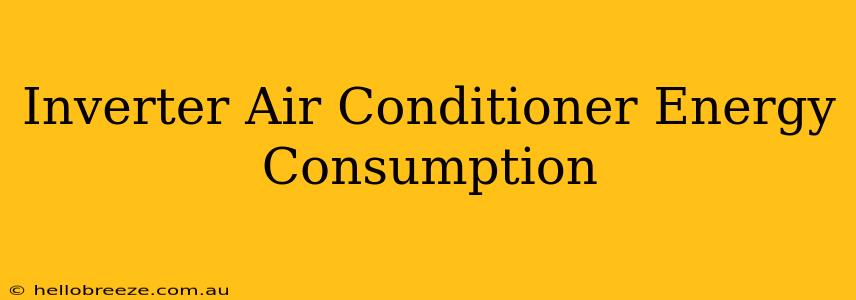Are you considering an inverter air conditioner but worried about its energy consumption? This comprehensive guide will delve into the intricacies of inverter AC energy use, helping you make an informed decision. We'll explore how they differ from non-inverter models, factors influencing energy consumption, and tips for minimizing your energy bill.
Understanding Inverter AC Technology
Unlike traditional air conditioners that cycle on and off, inverter ACs continuously adjust their compressor speed to maintain the desired temperature. This continuous operation minimizes energy waste associated with the frequent starting and stopping of the compressor. This is the core reason why they are generally more energy-efficient.
Key Differences from Non-Inverter ACs:
- Compressor Speed: Inverter ACs have variable-speed compressors, while non-inverter models have fixed-speed compressors.
- Energy Efficiency: Inverter ACs boast significantly higher energy efficiency ratings (SEER and EER) compared to their non-inverter counterparts.
- Temperature Stability: Inverter ACs offer more precise temperature control, leading to a more comfortable and consistent indoor environment.
- Reduced Wear and Tear: The smoother operation of the compressor in inverter ACs leads to less wear and tear, extending the lifespan of the unit.
Factors Affecting Inverter AC Energy Consumption
Several factors can influence how much energy your inverter air conditioner consumes:
1. AC Size and Capacity:
Choosing the right size AC is crucial. An undersized unit will work harder and consume more energy to cool the space, while an oversized unit might cool too quickly and then cycle on and off frequently, negating the energy-saving benefits of inverter technology.
2. Insulation and Sealing:
Poorly insulated homes or those with air leaks allow cooled air to escape, forcing the AC to work harder and consume more energy. Investing in proper insulation and sealing can significantly reduce energy consumption.
3. Usage Habits:
Leaving your AC running at a very low temperature or for extended periods when unnecessary will increase energy consumption. Setting the thermostat to a comfortable, yet energy-efficient temperature, and using timers or smart controls can help optimize energy use.
4. Ambient Temperature:
The hotter the outside temperature, the harder your AC will have to work, leading to increased energy consumption. Consider using energy-efficient window coverings to help reduce heat gain.
5. Maintenance:
Regular maintenance, including cleaning or replacing air filters, is essential for optimal performance and energy efficiency. A clogged filter restricts airflow, causing the AC to work harder.
Tips for Minimizing Inverter AC Energy Consumption
Here are actionable steps you can take to lower your inverter AC's energy consumption:
- Choose the right size: Conduct a proper load calculation to determine the appropriate BTU rating for your space.
- Maintain optimal temperature settings: Set your thermostat to a comfortable temperature and avoid drastic swings.
- Utilize smart features: Many modern inverter ACs offer smart features like scheduling and energy-saving modes.
- Improve home insulation: Seal air leaks and enhance insulation to minimize heat transfer.
- Regular maintenance: Clean or replace filters regularly and schedule annual professional maintenance.
- Use energy-efficient window coverings: Block sunlight to reduce heat gain.
- Consider a programmable thermostat: Set the temperature automatically according to your schedule.
Conclusion
Inverter air conditioners offer significant energy savings compared to traditional units. By understanding the factors influencing energy consumption and implementing the tips outlined above, you can maximize the energy efficiency of your inverter AC and significantly reduce your electricity bills while enjoying a comfortable and cool environment. Choosing an inverter AC is a smart investment in both comfort and energy efficiency.

